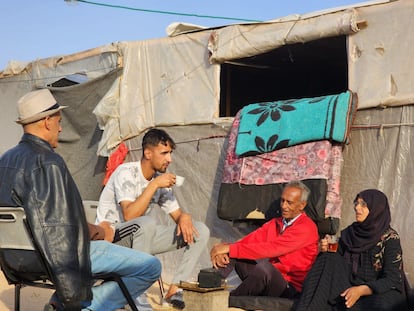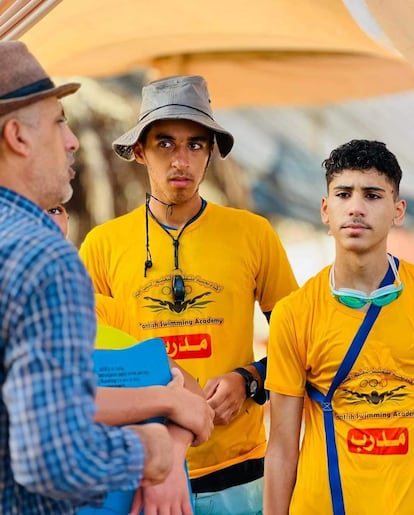They swam to be free: Amjed Tantish’s team has been rocked by war in Gaza
A group of Gazan swimmers had been training for years, overcoming restrictions and a lack of resources to represent Palestine at the Olympic Games. Bombs cut short both plans and lives. Their story reveals the extent of the destruction of a society that strived for normalcy


Thirteen young men pose, smiling in their swimsuits, alongside their coaches in front of a 25-meter-long pool in Jabalia, on the northern end of the Gaza Strip. It is a photograph from July 2023, but it seems as though many years have passed since it was taken. The vast majority of the team’s swimmers have never dived into a competition-sized pool or left the 140 square miles of this territory, but they had been training hard for years, amid waves of violence, restrictions on their movement and a lack of material means. Their goal was to reach the Olympic Games.
But after more than seven months of war, the team has been shattered and the lives and circumstances of its swimmers have become a reflection of the destinies of the majority of the 2.2 million inhabitants of the Strip. “They were a very good team. We tried to qualify for Tokyo 2020, but we couldn’t due to the pandemic, and then for Paris 2024, the few chances we had disappeared with the war,” says Amjed Tantish, coach and founder of the northern Gaza swimming school, to this publication.
Two of the swimmers in the photograph have died since October. 17-year-old Yazan Al Kaseeh took a bullet to the neck, and 14-year-old Hamoudi Mossalem died in a bombing with his father in northern Gaza. His brother Bakir, also a member of the team, was wounded in the same attack. Another two swimmers are trapped with their families in the north, five are displaced in Rafah, in the south, and three have managed to flee the Strip.
“Swimming is my escape, the moment I feel free.” The gruff voice of 22-year-old Abed Raboo Kilany sounds in a humble tent in Rafah, in the southern Gaza Strip, where tens of thousands of displaced people have been dodging death for months. It is the fifth place this young man and his family have taken refuge in since October. “Being in the water gives me energy, it makes me feel good, physically and mentally. I let my imagination run wild and I see myself representing Palestine in important championships,” he says.

But today, Kilany’s dreams seem further away than ever. The young man is a great swimmer, but his pool has often been the Mediterranean Sea, as splendid as it is polluted and almost always full of conflict and death. That blue immensity provided the inhabitants of the Strip with a false sense of freedom after the 17 years of an Israeli blockade that has isolated them by land, air and sea. Young people under 25 like Kilany, who represent 65% of the population, have never known a Gaza with doors open to the world. Their lives are marked by the onslaught of the conflict.
“I don’t see any future for Gaza or for myself. The war has destroyed everything,” sighs the swimmer. “I have my sights set on the 2028 Olympic Games, but will I be able to practice? Will I be able to leave to train somewhere else if there’s no place here?” he asks.
A swimming pool in the ocean, built with debris
Who hasn’t felt that pleasant lightness upon entering the sea, floating, looking up at the sky or diving underneath the waves? In Gaza, that feeling is even more intense and liberating. Tantish, 47, experienced it at a very young age, but had to wait years and go to Egypt to study before he was able to practice in a real 50-meter-long competition pool. His other dream was to go to the Olympics, having won several championships in the backstroke, but he did not achieve the necessary time. So, he returned home and began teaching children in Gaza, where few people knew how to swim despite living by the sea. That first summer, now some 20 years ago, classes were held in the fishing port and five kids attended. Months later, there were 40, and after some years there were more than 400, including an increasing number of girls.
The obstacles for Tantish’s school have been many: the second Intifada (2000-2005), the arrival of the Islamist Hamas government, the blockade and successive Israeli military offensives. Over the years, the Gazan coach has built several pools and, above all, improvised to keep the program going. For example, in 2015, after the pool in which they were training was destroyed during a violent Israeli offensive, he moved cement blocks from bombed houses into the ocean to create barriers and be able to teach his classes in calm waters. “The kids needed to swim and I am a determined man,” he says. Since 2020, his best male swimmers, the ones in the photograph, trained in the Jabalia pool, which once stood in a Gaza amusement park, now a pile of ruins.
“These swimmers are like my children. I’m in touch with all of them, but this war has decimated and separated the team. Still, I want to think that this is not the end, that the dream doesn’t end here,” Tantish says, thinking aloud.
The Gazan tells his story and that of his team via WhatsApp messages, text and voice communications, and in short videos, which arrive from the Strip with no small degree of difficulty. Tantish, his wife and five children have been displaced to a tent in Rafah since January. They fled their home in Beit Lahia, in the north, days after the October 7 Hamas attack on Israel, in which some 1,200 people were killed and some 120 taken hostage, according to official figures. Since, the Israeli offensive in Gaza has killed more than 37,000 Palestinians.
“I have to look for a place for my family again because we are in too much danger here,” says Tantish. It is May 11 and he fears an Israeli ground offensive in Rafah. Messages are interrupted for several days and then he reappears in Khan Younis, north of Rafah, in another refugee camp. “We have little food and almost no water, you have to walk quite a distance to get it,” he says, appearing in a video to be visibly faded. His muffled voice cracks. “Nothing will ever be the same after this, none of our children and young people will come out of this war unscathed,” he says.

Bakir Mossalam, another swimmer from the team, is a clear example of his words. He is 17 years old and has had to grow up fast after seeing his father and brother Hamoudi die in a bombing that left Mossalam with a neck wound. Now, he is the head of his family, which has sought refuge in a U.N. shelter in northern Gaza.
A few miles from the U.N. camp where Mossalam’s family is sheltered, another devastated mother, Afifa Al Kaseeh, recalls, her son’s passion for the sea. Yazan was shot dead in January. “He loved the water ever since he was a kid. He loved big waves. He had many qualities and excelled quickly, he trained a lot. I was scared when he swam far out to sea, but he didn’t listen to me and went out every day, no matter if the weather was bad,” says the university professor via WhatsApp voice messages.
Waters that heal
Abdel Rahman Tantish, who is 21 years old and one of the team’s best swimmers, was able to leave Gaza three months ago thanks to his Egyptian passport and is training in a Cairo swim club. “I left by myself and I am really suffering from seeing how my family is living in Gaza. I can’t sleep for thinking about them. Everything looks black, I don’t see any future in Gaza. I only leave my suffering behind when I get into the water,” says the young man, who is Tantish’s nephew.
Compared to many of his teammates he’s been lucky, although his daily life in Cairo is complicated and above all, expensive. The young man counts every penny he spends and tries to stay motivated by remembering his goal. “I aspire to become one of the best swimmers in the Arab world and to get to the 2028 Olympic Games in Los Angeles. That’s why I left Gaza. I want to represent Palestine in the championships and tell the world that the people of Gaza love life and only want to live like other people in other places in the world,” he says.
Tantish is still driven to make his dreams a reality. From his flimsy tent in Khan Younis, the trainer reiterates that he will resume swimming lessons in the sea “as soon as possible,” just like “it happened before.” Still, he knows that this time, everything will be much more difficult. He doesn’t even know what will happen tomorrow, if they will have to flee again, and if so, where they will go. “Our children have suffered too much. Swimming will make them laugh again and give them hope. They need, more than ever, to feel that. They need a chance,” he says.
The Mediterranean Sea waits, less than a one and a quarter miles from the place where Tantish sends his messages, but the distance seems insurmountable at the moment. The last time he swam was January 18, when his family arrived in Rafah. He entered the water late in the afternoon, feeling like if he didn’t, he would explode. “It was wonderful, the only good moment from all these months. After weeks of war, the ocean water cleaned and healed my soul. I felt my determination return.”
Sign up for our weekly newsletter to get more English-language news coverage from EL PAÍS USA Edition
Tu suscripción se está usando en otro dispositivo
¿Quieres añadir otro usuario a tu suscripción?
Si continúas leyendo en este dispositivo, no se podrá leer en el otro.
FlechaTu suscripción se está usando en otro dispositivo y solo puedes acceder a EL PAÍS desde un dispositivo a la vez.
Si quieres compartir tu cuenta, cambia tu suscripción a la modalidad Premium, así podrás añadir otro usuario. Cada uno accederá con su propia cuenta de email, lo que os permitirá personalizar vuestra experiencia en EL PAÍS.
¿Tienes una suscripción de empresa? Accede aquí para contratar más cuentas.
En el caso de no saber quién está usando tu cuenta, te recomendamos cambiar tu contraseña aquí.
Si decides continuar compartiendo tu cuenta, este mensaje se mostrará en tu dispositivo y en el de la otra persona que está usando tu cuenta de forma indefinida, afectando a tu experiencia de lectura. Puedes consultar aquí los términos y condiciones de la suscripción digital.








































